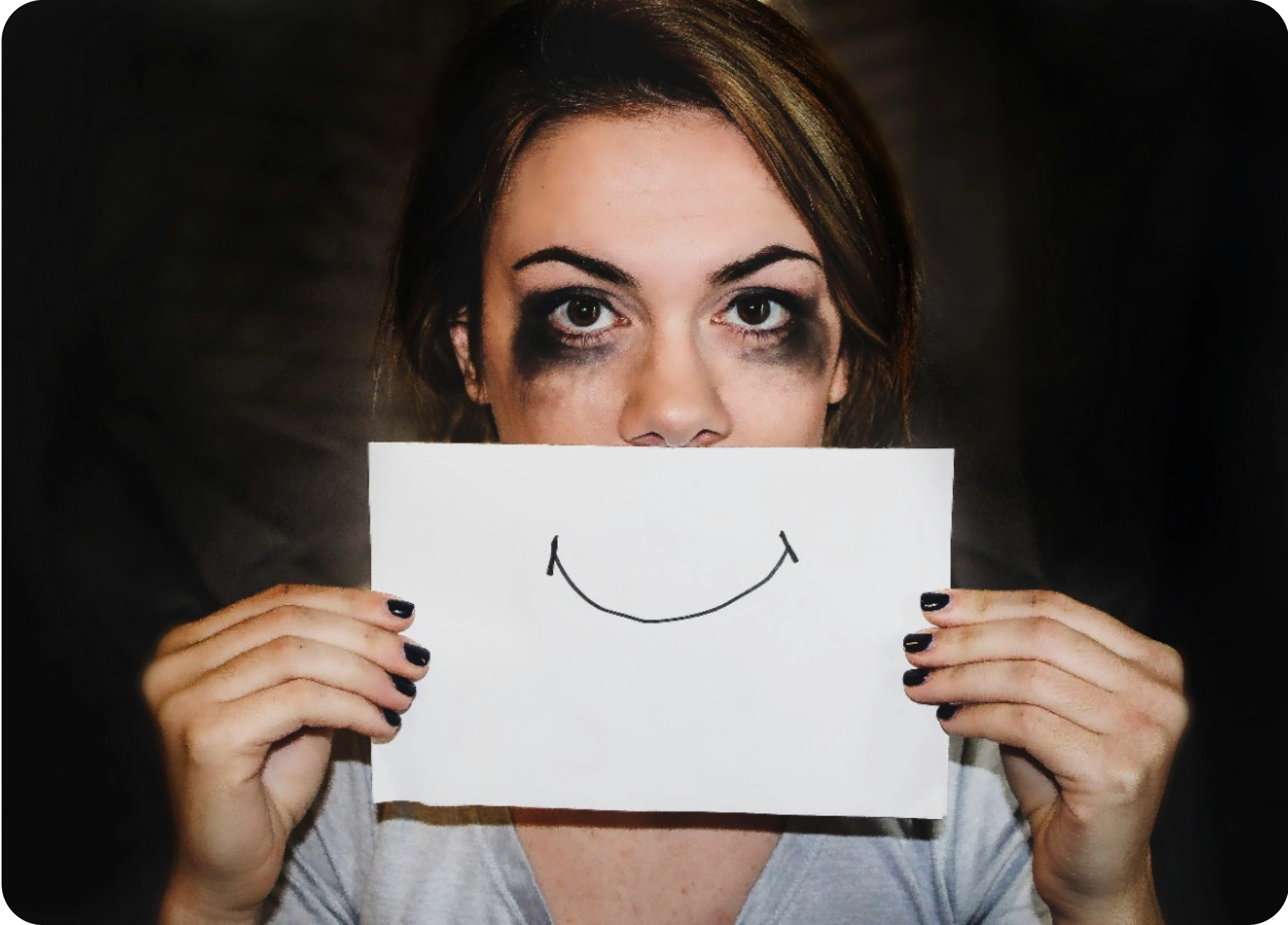Mood Disorders: The Signs, Symptoms, Causes, and Treatment

Seeking info about mood disorders?
Check out our comprehensive guide or reach out to us for more questions!

What Are Mood Disorders?
Mood disorders are mental health conditions that affect your emotional state. The National Institute of Mental Health (NIMH) reports that about 21.4% of American adults will experience a mood disorder such as depression or bipolar disorder during their lifetime.
Ongoing feelings of sadness, hopelessness, numbness, extreme mood swings, and more can all be signs of a mood disorder. These feelings go beyond ordinary experiences of grief, stress, or sadness. Mood disorders make enjoying life extremely difficult.
Here’s some facts about common mood disorders.
Symptoms of MDD include:
- Persistent feelings of sadness, hopelessness, worthlessness
- Loss of interest in activities you once enjoyed
- Changes in appetite and sleep habits
- Fatigue, lack of energy
- Difficulty concentrating and making decisions
- Thoughts of death or suicide
A major depressive episode may occur just once in your life. But it's common for major depression to come back multiple times if left untreated. Episodes often begin following a major life stressor but then persist long after the event is over.
Read moreDepression symptoms may include:
- Sad, anxious, or empty mood
- Feeling hopeless or worthless
- Weight changes
- Changes in sleep habits like insomnia or sleeping too much
- Physical aches and pains with no apparent cause
- Fatigue and lack of energy
- Difficulty concentrating and making decisions
- Thoughts of death or suicide
During manic episodes:
- Extreme elevation or irritability in mood
- Increased energy and restlessness
- Impulsive or reckless behavior
- Racing thoughts and rapid speech
- Decreased need for sleep
- Grandiose sense of self-importance
- Impaired judgment
During depressive episodes:
- Sadness
- Hopelessness
- Lack of energy and fatigue
- Difficulty concentrating
- Changes in sleep and appetite
- Thoughts of death or suicide
Manic and depressive episodes can last weeks or months. The cycles of bipolar disorder are often unpredictable and uncontrollable without proper treatment. According to Mental Health America (MHA), bipolar disorder affects both men and women equally, with similar rates of occurrence across genders.
Read moreSigns of persistent depressive disorder can include:
- Low self-esteem and feelings of inadequacy
- Hopelessness or pessimism
- Loss of interest in usual hobbies, activities
- Decreased productivity and avoidance of responsibilities
- Social withdrawal and isolation
- Fatigue, low energy, sluggishness
- Sleep disturbances
- Difficulty concentrating, indecisiveness
- Appetite changes, weight gain or loss
Ready for Change?
Contact us today! Take the first step to a wholesome you.
Symptoms include:
- Sadness
- Anxiety
- Irritability
- Fatigue
- Lack of energy
- Social withdrawal
- Oversleeping
- Overeating, craving carbs
- Weight gain
Symptoms typically resolve in spring and summer months when there is more sunlight. Light therapy, involving regular exposure to artificial light, can help treat SAD. Antidepressants may also be prescribed.
Read moreSymptoms of PMDD include:
- Depression, hopelessness
- Anxiety, tension
- Extreme mood swings
- Irritability, anger
- Lack of interest in usual activities
- Fatigue, low energy
- Changes in appetite or sleep
- Physical symptoms like bloating, breast tenderness, headaches
Symptoms improve after your period starts and must reoccur monthly to be considered PMDD. Oral contraceptives and antidepressants can help manage symptoms. Lifestyle changes like stress management, exercise, and dietary adjustments may also help.
Read moreSymptoms include:
- Frequent, persistent temper tantrums (at least 3 times per week)
- Sad, irritable, or angry mood between outbursts
- Reactions grossly out of proportion to the situation
- Symptoms present in multiple settings, like home and school
Symptoms must begin before age 10, be present for at least a year, and not be due to a developmental disorder like autism. Parents often mistake this disorder for bipolar, but treatments differ.
Read more
Do I Have a Mood Disorder?
Coping with ordinary difficulties like setbacks, grief, or stress is a normal part of life. But if your emotional struggles persist and start to feel out of control, you may need professional treatment.
Signs your mood requires medical care include:
- Depressed or elevated mood lasting weeks
- Mood disrupting your work, school, and relationships
- Thinking about self-harm
- Withdrawing from family/friends
- Mood swings that feel uncontrollable
- Depression or mania that keeps returning
- Anxiety accompanying depression
- Abusing drugs, alcohol, or food to cope
- Extreme fatigue, lack of energy
- Physical issues like headaches, body aches
- Difficulty functioning due to mood
Seeking help is a courageous act. At the Edge Treatment Center, we won't judge you for what you're going through. Everyone deserves compassion, and our team has endless compassion for your situation. Take the first step and call today for a free consultation.

Reclaim Your Joy
Rediscover the joy and peace you deserve with our comprehensive mental health support. No matter the challenge you're dealing with, we are here to offer you the compassion and expertise you need to navigate your path to recovery.
Reach out to us today for a compassionate consultation, and take the first step towards reclaiming your happiness. Reach out to us today for a compassionate

Underlying Causes of Mood Disorders
Mood disorders do not have a single cause. Usually, a combination of genetic, biological, environmental, and psychological factors contributes to their development. Common factors include:
Chemical Imbalances
Brain chemistry regulates mood and emotions. The key chemicals involved are serotonin, dopamine, norepinephrine, and GABA. For those with mood disorders, these neurotransmitters a re often out of balance. Medications can help restore optimal levels.
Heredity
Many mood disorders have genetic components and run in families. You are more likely to develop depression, bipolar disorder, or anxiety if you have a family history. But genes alone do not determine your destiny. Environmental triggers and learned behavior also play a significant role.
Trauma and Stress
High stress levels, traumatic experiences, and severe life events can impact brain chemistry and trigger mood episodes or disorders. Things like childhood abuse or neglect, the death of a loved one, divorce, job loss, and other challenges can impact mood. Developing healthy coping skills is essential.
Substance Abuse
Abusing alcohol, recreational, or prescription drugs can both cause and worsen mood disorders. Some people with untreated conditions self-medicate this way. Breaking these habits is critical for a full recovery.
Medical Conditions
In some cases, underlying illnesses contribute to mood disorders. Conditions like thyroid disease, chronic pain, Alzheimer's, dementia, Cushing's disease, and more are linked to increased risk for depression and mood problems. Treating the medical issue can help.
Personality Factors
In some cases, underlying illnesses contribute to mood disorders. Conditions like thyroid disease, chronic pain, Alzheimer's, dementia, Cushing's disease, and more are linked to increased risk for depression and mood problems. Treating the medical issue can help.

Why Getting Evidence-Based Treatment for Your Mood Disorders Is Essential
Mood disorders should be treated by medical and mental health professionals specially trained in these conditions. Research shows that evidence-based treatment leads to better long-term outcomes. The key is early intervention and integrated care over the long haul. This typically involves:
Medication
Antidepressants, mood stabilizers, and other psychiatric medications help balance brain chemicals that regulate mood. They provide ongoing maintenance and control of symptoms. Newer medications cause fewer side effects. Finding the proper med or combination takes patience.
Psychotherapy
Talk therapy provides coping strategies, identifies triggers, resolves past traumas, replaces negative thought patterns, and more. Cognitive behavioral therapy (CBT) and dialectical behavior therapy (DBT) have strong evidence behind them. Therapy rewires the brain over time.
Mind-Body Therapies
Stress-reducing mind-body practices like meditation, yoga, art therapy, music therapy, and exercise complement other treatments. Healthy lifestyle habits also boost overall wellness. Integrated care works best.
Support Community
Group therapy, peer support groups, and social connections provide community and accountability. Psychoeducation teaches you how to manage your specific disorder. Lifelong peer support aids recovery.
Consistency and commitment are vital – mood disorders quickly spiral out of control when treatment is interrupted. Our comprehensive programs equip you with the tools and support system for staying the course.

Paint a Brighter Future
Your future is in your hands. Take the first step towards a fulfilling life now.



Mood Disorders Are Treatable!
Living with untreated depression, bipolar disorder, or other mood illnesses takes a painful toll on all aspects of life. Left untreated, they can lead to some awful outcomes, including addiction.
But with proper professional care tailored to your situation, you can overcome your struggles and reclaim a meaningful, joyful life. Our treatments work, and most of our clients see significant improvement in symptoms quite early.
You deserve a better life, and with our help, you’ll get there. With commitment and patience, you can get back to enjoying life to the fullest. The Edge Treatment Center offers integrated care personalized just for you based on proven methods developed by the nation's top researchers. We meet you where you are with empathy, compassion, and respect.
Real change is possible! Contact The Edge Treatment Center today.
FAQ
Frequently Asked Questions
Some common signs include persistent sad or anxious feelings, sleeping too much or too little, extreme changes in mood, inability to enjoy life, withdrawing socially, and thoughts of death or suicide.
Yes, psychiatric medications like antidepressants, mood stabilizers, and anti-anxiety drugs can help regulate brain chemistry and greatly reduce mood disorder symptoms. They are often an essential part of our treatment plans.
It varies per person, but most people notice some improvement in symptoms within a few weeks. However, finding the proper treatment takes time, and you'll likely need ongoing maintenance.
We offer both levels of care. Outpatient provides more flexibility, while inpatient offers round-the-clock support. We'll help assess what's best for your situation.
Our programs utilize evidence-based therapies like CBT, DBT, medication management, mindfulness practices, experiential therapies, and peer support groups. We develop customized plans that meet each client's needs.
Outpatient programs can range from 2 weeks to several months. Inpatient programs average 30-90 days. We also offer lifelong aftercare to support ongoing recovery post-treatment.